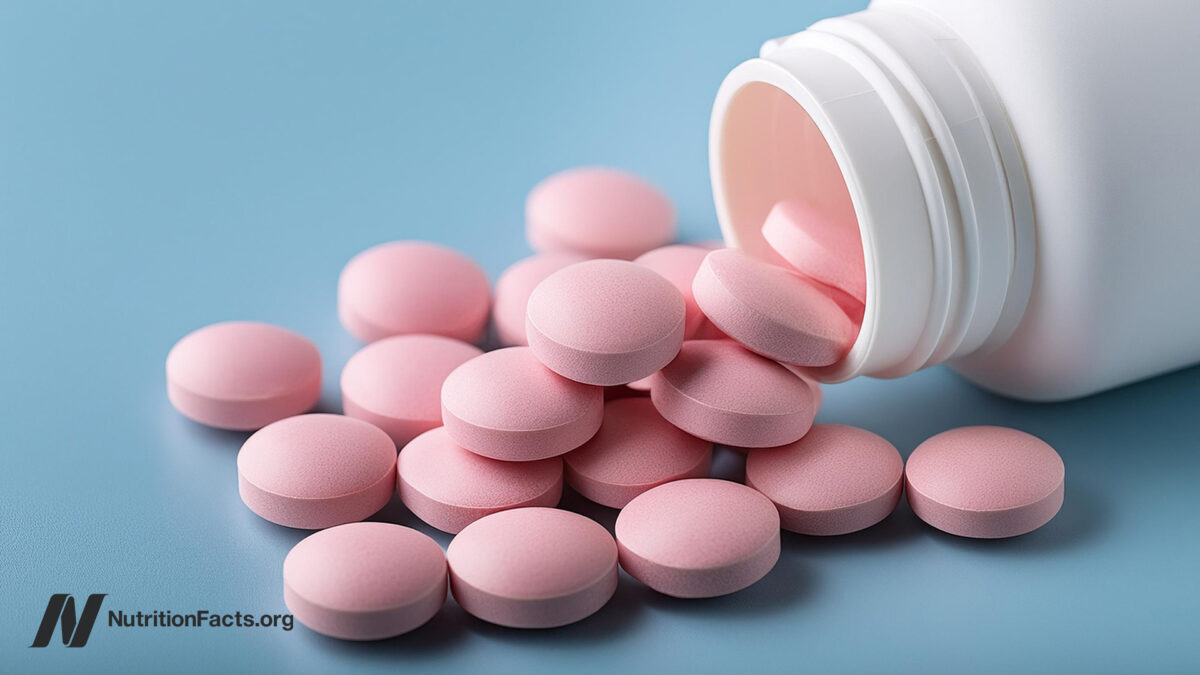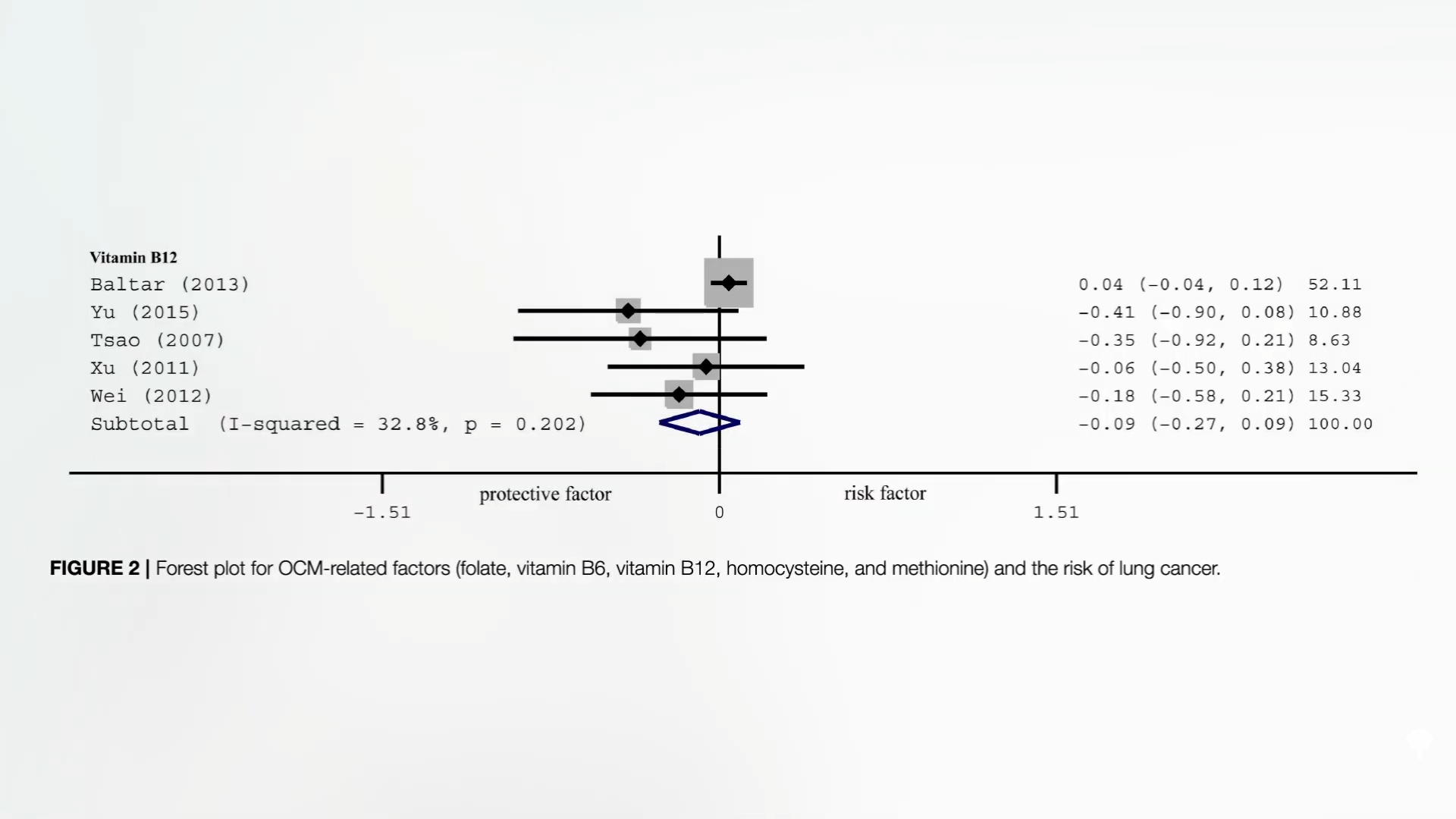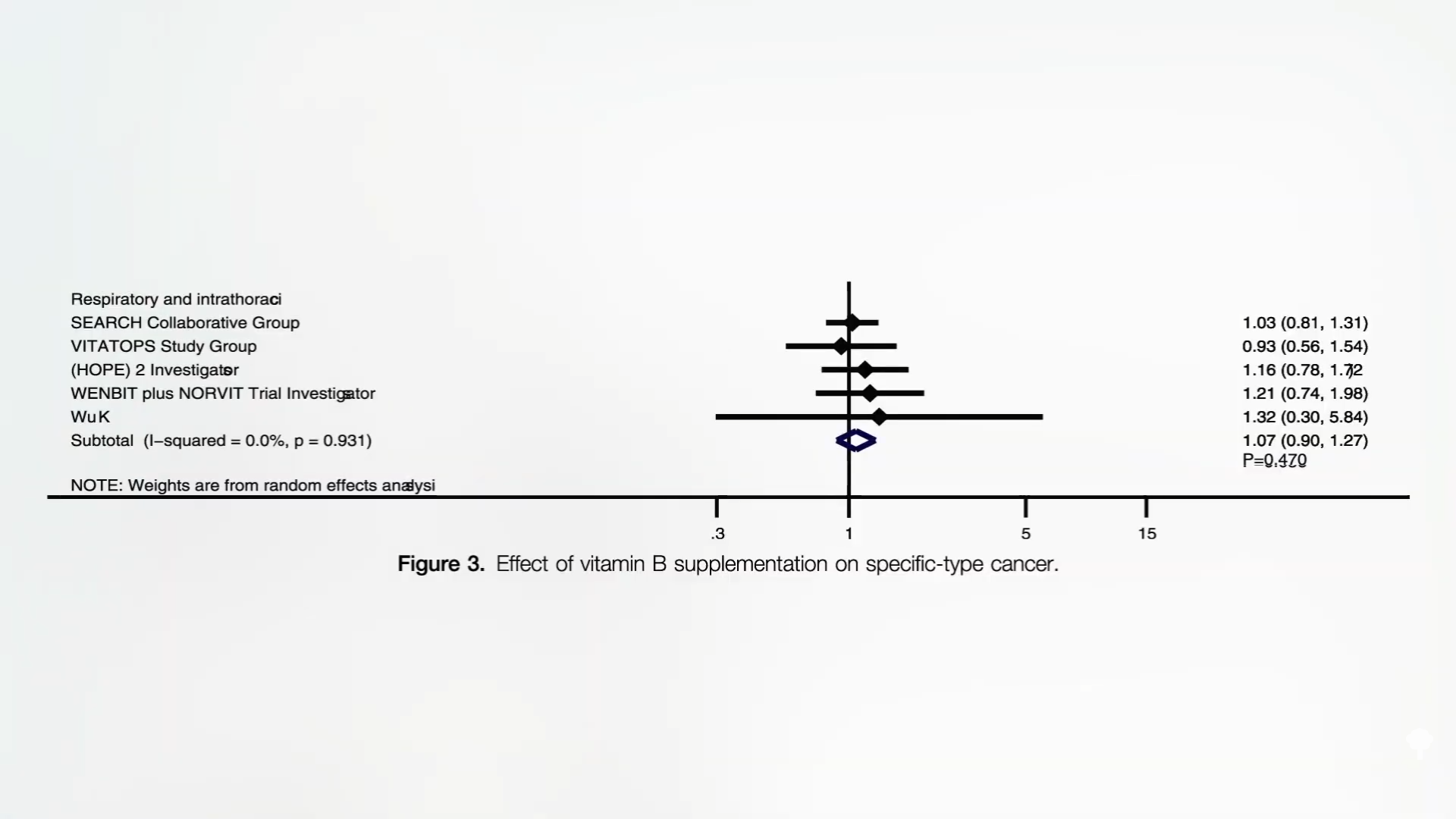
What do randomized controlled trials of daily high-dose vitamin B12 supplementation show about its effects on cancer risk, death, and longevity?
In 2019, “Association of high consumption of vitamins B6 and B12 from foods and supplements with risk of hip fracture among postmenopausal women in the [Harvard] Nurses’ Health Study” was published. However, note that only the combined high intake of vitamins B6 (≥35 mg/day) and B12 (≥20 mcg/day) was associated with an increased risk of hip fracture. We know that treatment with high doses of vitamin B6 can increase risk of hip fracture alone. After about a decade, those who had been taking high-dose B6 supplements (40 mg) had about a 40 percent increased risk of hip fracture, but not those taking B12, as you can see below and in the minute 0:35 of my video. Do vitamin B12 supplements cause bone fractures and lung cancer?.
That’s what the Harvard study foundalso. High vitamin B12 intake alone was not associated with increased risk. In fact, some observational studies suggest a slightly lower risk of fracture with elevated levels of vitamin B12 in the blood. However, what we care about most are the intervention studies, where people are randomly assigned to receive B12 so we can see what happens, and when we look at them, we know find there is no increased risk of fracture among those receiving B12. In conclusion, according to randomized controlled trials, high doses of vitamin B12 have not been shown be associated with the risk of fractures.
Okay, but what about this? In 2017, a study found that men who took vitamin B12 supplements appeared to have a higher risk of lung cancer. Now, the researchers found no such association in women, and the increased risk occurred primarily among men who smoked. Could it be that B12 was feeding Tumors in the making? It’s hard enough to imagine a vitamin being carcinogenic on its own, especially if it somehow only affects men and not women as well. «Replication of these findings in additional prospective studies with careful measurement of vitamin B supplement use is warranted.» And, in fact, when you put all the observational studies together, there are is There is no significant correlation between lung cancer and blood B12 levels, whether you smoked or not. If anything, most studies seemed to trend toward higher levels of B12 being protective, as you can see below and at 2:03 in my video.

Then, in 2018, a new study found an association between overall lung cancer risk and higher circulating levels of B12, which again appears to be more concerning for smokers, as seen here and at 2:16 in my video.

Now this was another observational study. Those with higher levels of B12 were seen to have higher levels of cancer. Those of you who have followed my work know the drill: there are two potential problems that arise in observational studies that prevent us from attributing cause and effect: confounding factors, also known as “lurking variables,” and reverse causality.
What could be a lurking variable in this case? What could be a third factor associated with both higher B12 levels and cancer that could be the true cause? Well, who has higher levels of B12 circulating in their blood? those who eat lots of meat and dairy, which are, in fact, “the most important contributors to serum vitamin B-12,” that is, B12 in our blood. And those who eat more meat tends to have more lung cancer: “Dose-response analysis showed that consumption of 120 g of red meat per day could increase the risk of lung cancer by 35%, and consumption of 50 g of meat processed per day could increase the risk of lung cancer. risk of lung cancer by 20%.” So, generally we’re talking about a 35 percent higher risk for each quarter-pound hamburger eaten each day and about a 20 percent higher risk for each serving of breakfast sausage. It is not surprising that those with higher levels of B12 in their blood may have more lung cancer. B12 could simply be a marker of meat consumption.
And, if you remember, reverse causation is when X may not lead to Y, but Y may lead to B12 in the blood. And, in fact, almost 75 percent of patients diagnosed with cancer exhibit elevated levels of B12. Therefore, elevated B12 levels may simply be a cancer marker. In addition to taking extra B12, there are are all kinds of reasons why your levels can increase such as liver problems, kidney problems, bone marrow problems and cancer as you can see below and at 3:50 in my video. Therefore, high B12 levels may simply be a marker of budding, but not yet diagnosed, cancer.

What specifically happens with observational studies? link But the use of B12 supplement for lung cancer? Those could also be Reverse causality: “The consequence of being at risk for cancer is that patients will adopt healthier behaviors, including taking multivitamins (reverse causality). “Well-established causes, such as smoking, chronic obstructive pulmonary disease, and previous cancers, are the real risks of lung cancer.” So, we are left with this “chicken or egg causality dilemma,” which is why, ideally, we need randomized controlled trials to see if there is any cause and effect.
This became even more urgent with genetic evidence. suggestion that those born with higher levels throughout their lives may be at greater risk. Fortunately, as you can see below and at 4:47 in my videowe have randomized controlled trials: more than a dozen randomized controlled trials randomize In fact, thousands of people have ingested up to 2,000 micrograms of B12 each day for years.

The findings? «Vitamin B supplementation has no effect on cancer incidence, cancer death, or total mortality.» And this includes looking specifically at lung cancer, as seen below and at 5:02 in my video. In fact, vitamin B supplements may reduce the risk of the most dangerous form of skin cancer.

If you missed my previous video, check out Do Vitamin B12 Supplements Cause Acne?
For my other B12 Updatescheck out related posts below. All of these videos can be found in a digital download: Latest vitamin B12 recommendations.
I have also explored the role of vitamin B12 in stroke risk. See related posts below. That series is also available for digital download: Why are vegetarians at higher risk of stroke?.






